**Trigger warning for violence**
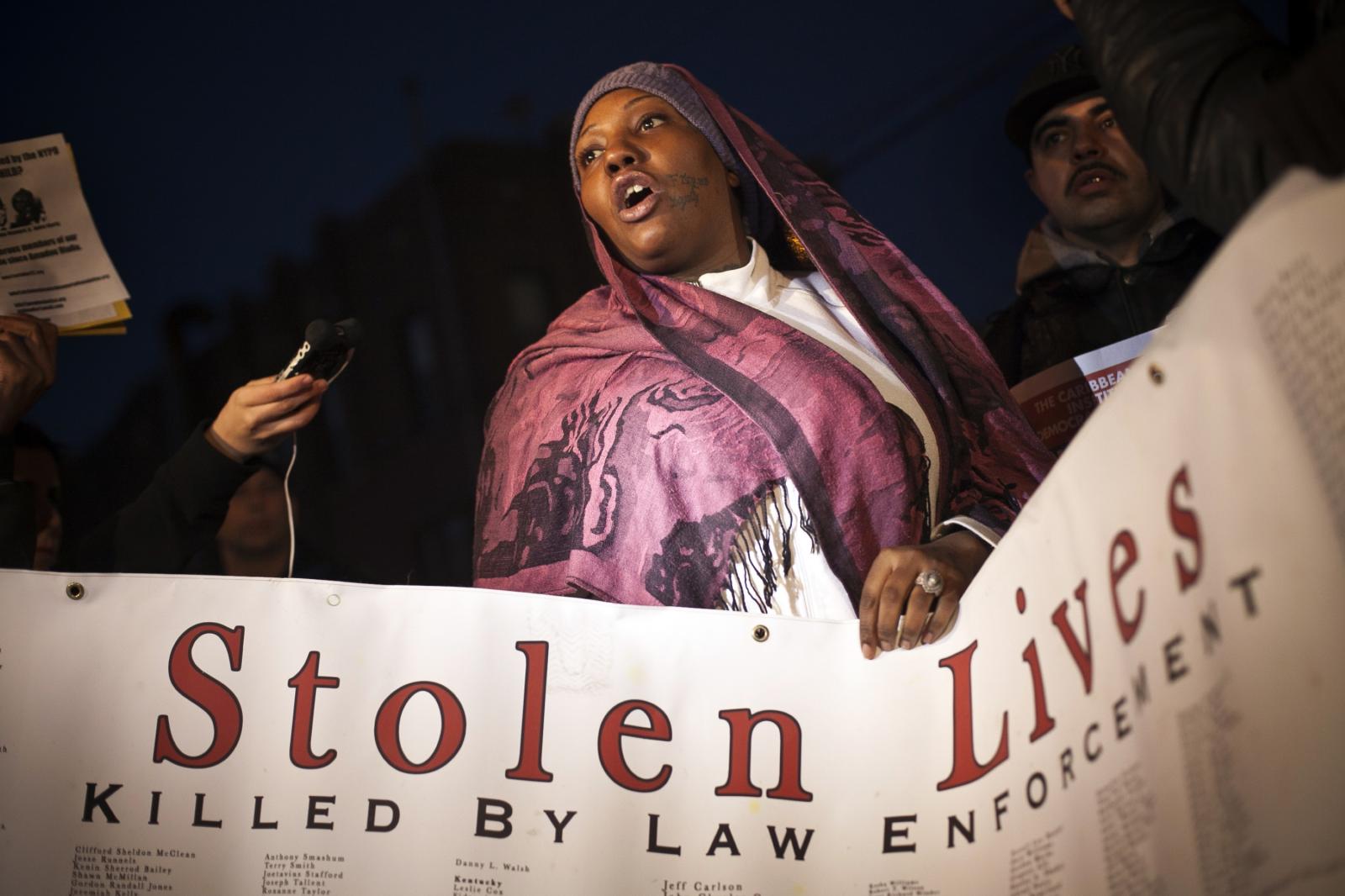
I’ve been trying to wrap my mind around the situation with Kimani Gray, but it just doesn’t make sense. I mean, considering the unceasing frequency of U.S. American police brutality, the story is “simple” enough. Ten days ago, sixteen-year-old Kimani, known as KiKi to his loved ones, was out late, returning from a gathering. While out in East Flatbush, Brooklyn, Kimani and his friends were approached by two men, apparently plainclothes undercover police officers with records of brutality and excessive force, who sidled up in an unmarked van. While those close to Kimani claim the youth was simply adjusting his belt or waistband, the police have claimed that Kimani pulled out a .38, which caused the officers to unload eleven rounds of ammunition into his body, killing him there in the street.
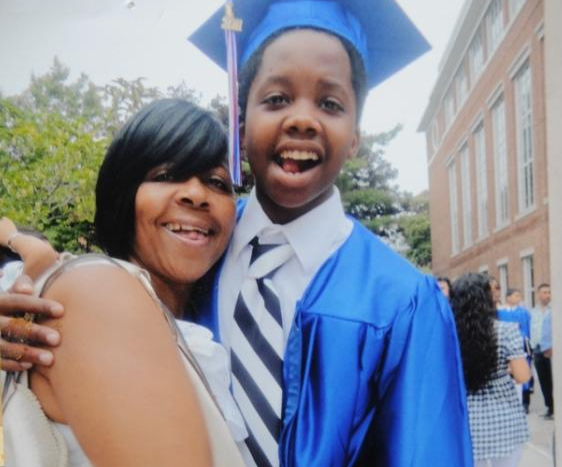
Simple, right? Not even close.
For every Black and Brown person I’ve spoken with, this is so clearly another example of our communities’ ever increasing militarization that not only marks our bodies as inherently deviant and always guilty, but that is also hell bent on killing and/or imprisoning our people with impunity.
Although they are little more than half the population of New York, African Americans and Latinos were subject to almost 90% percent of the incidences of stop-and-frisk in the city in recent years. Stop-and-frisk policies are not only morally unsound, but statistics have clearly shown that they are also expensive and inefficient. The New Yorker reports “As for the effectiveness of stop-and-frisk, since Bloomberg doubled down on the program, in 2002, murder attempts, robberies, and assaults have fallen by less than one per cent. Arrests are made in about six per cent of the stops, and a firearm is found in about one per cent” (Source). Likewise, Vincent Warren notes:
Every first-year graduate student learns that correlation does not prove causality, but the NYPD routinely claims that the city’s falling crime rates are caused in part by their stop-and-frisk practices. There is not a single published study providing evidence for this claim. The truth is that no one knows what has caused the city’s drop in crime, but given the fact that only 6% of stops result in arrest and the vast majority of these are for so-called quality of life violations, it seems improbable, to say the least, that crime rates are going down because of stop and frisk. (Source)
Then again, cost is no object in a police state, right?
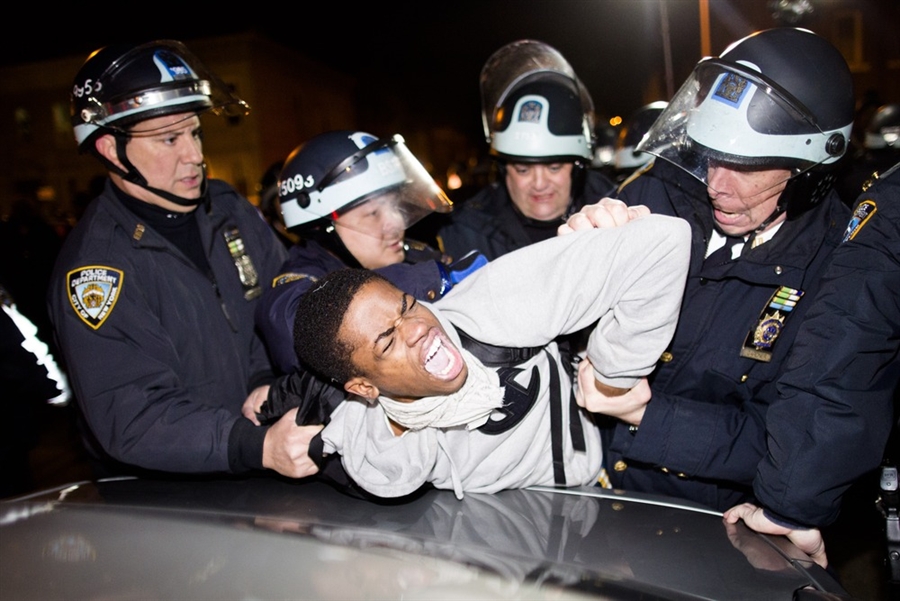
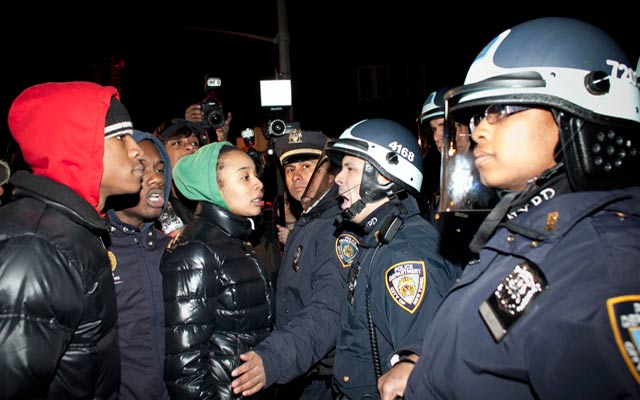
Reading about Kimani’s story, takes me back to my own youth in Fort Lauderdale, Florida where I witnessed police negligence and violence firsthand. While they could never be counted on to come when someone was going upside your head or stealing someone’s car, they for damn sure would show up and show out in other moments, making my already unsafe hood even less safe. I learned to be more afraid of the police than my dopefiend neighbor who bashed my bedroom window open to steal or the pimps that stood just outside the gate of middle school everyday at 3pm. They were treacherous, but I knew how to deal with them. But the police—they were a wild card. They could come into your house, disrespect you, put their hands on you, talk to you any kind of way, and you’d just be standing there contemplating the virtues of taking a cast iron frying pan to their skulls but remembering your duty to your family. But, for some people, sometimes that cast iron pan would win.
Twenty years ago, something happened with the police that I’ll never forget. I was an eighth grader, walking home from school. A big crowd had gathered to watch two girls, two of my classmates in fact, tussle. These sisters were rolling around and around in the dirt. Look, I wasn’t a fool. I wasn’t really trying to be all up in this altercation, but the crowd was so big that I couldn’t get through or around it. So I watched, shaking my head, knowing that one girl was jealous of another and that some knucklehead dude was at the center of this drama. It wasn’t until they separated that I saw how horrible the fight had been. The sister that initiated the fight had carried a razor blade in her mouth and sliced the other girl on her face and neck. This young sister stumbled past me, her face and neck swollen and bloodied, her white t-shirt splattered with her own blood.
I could not believe my own eyes. I had just watched someone get stabbed. I was appalled. I was disgusted. I was worried for my classmate. Would she bleed to death? (She did, in fact, live). She lived a block away from me, but despite her injuries, seemed to be making a defiant walk home. I looked around to see if anyone was there to help. There were mostly other teens like myself, standing there with a mixture of curiosity, disbelief, and horror.
Then, I spotted the police. They had been in the background all along. I mean, they were always there along my route home, apathetic observers that never stopped when drug transactions were made brazenly, out in the open or when twelve-year-old girls were propositioned for sex in broad daylight. But on that day, they really jumped the shark. As I scanned the crowd, looking for an adult to help—my go to adult helper has always been older Black women—I saw the police pointing and laughing at my bloodied classmate. I’m not talking about a nervous giggle or an uncomfortable chuckle, but some of that old bent over, clutching your stomach, and wiping your eyes kind of laughter. Rather than going to the aid of an injured young woman (who was wounded by another injured young woman), these fools were laughing. It was as if we were all slaves in a Roman gladiator’s ring, killing each other for their amusement. The image of their laughter haunts me to this day.
Years later, when I read Toni Morrison’s Beloved in college, I came across this line that has stayed with me, haunting me, ever reminding me of the constant dehumanization Blacks endure under white supremacy. After the novel’s protagonist, Sethe, is abused by the whites that run her plantation, she remembers, “they handled me like I was the cow, no, the goat, back behind the stable because it was too nasty to stay in with the horses.” I felt that way, felt that way for my classmate, on the day I saw her stabbed and no one rushed to help her.
So, when reports allege that Kimani Gray pulled a .38 on the admittedly plainclothes officers, I do not think of black-on-black crime or an out of control urban Black youth population that are menaces to society. I think of a kid who lived in a war zone, a kid who could not only not count on those who vow to protect and serve to do either of those things, but who could also expect the police to be the major perpetrators of state sanctioned terrorism.
Let me be clear. I do not think that systemic violence is strategy that is going to liberate our communities. And I do not actually think Kimani had a weapon. However, I would understand why a kid would think he was in danger if two random dudes rolled up on him in a car and jumped out yelling. And I do understand the pain, anger, and frustration the protestors in East Flatbush have been expressing. And I wish that stories like this were not a constant unbroken loop in our communities, continually traumatizing us into silence and submission.
What are your thoughts on the situation surrounding Kimani Gray and his murder?
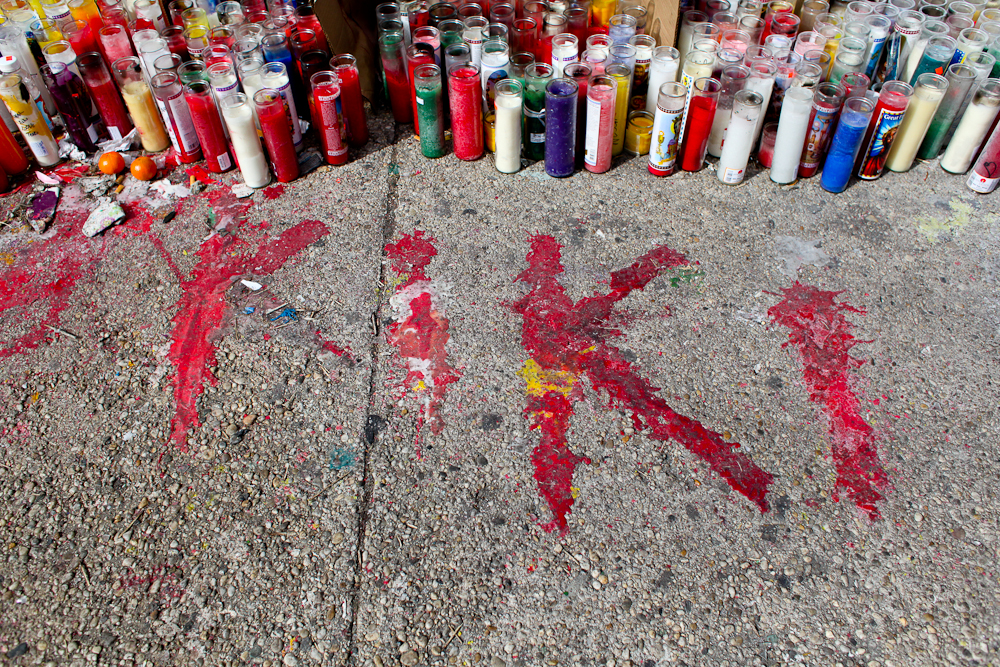

I got into it with some white dudes on Facebook regarding this issue. I have three younger brothers in NY (one lives in Brooklyn) and of all the things I FEAR is for them to have a run-in with the cops. Ain’t that some ish?? I’m so sick of the “he pulled a gun” argument that is used as a blanket statement to exonerate police and sway public opinion. Nearly every (non-black) person who knows about this story says “that’s what happens when you pull a gun on cops” without even stopping for a moment to see the big picture and the systematic failure of law enforcement when it comes to black/brown boys and men.
I am a ‘wordy” person, but the constant mindless, heartless actions, as shown here, have surpassed my ability to voice a coherent comment. I never thought I would say, “I give up,” not on the horror and insanity of the attitudes and actions that are the hallmarks–not aberrations–of the “protect and serve” aspects in our communities, but because I cannot conceive of how to successfully address, change and rectify the mayhem-disgust-chaos.
But he had a criminal record, some of which lends credence to the fact he had a gun (they his fingerprints on the gun they retrieved, yeah?) So what is a kid – 16 years old doing out at midnight with a gun. And a criminal record — he’s not the cute innocent kid the photos keep showing. He had years of criminal activity, not all of it in juvie, he was in adult court. He was precocious in his criminal behavior. I don’t know what to think about Stop and Frisk – 97 % of victims of gun crime in NYC is black and hispanic, if it saves even one life, is it worth it? What if that life was yours? I think this kid was going to kill someone eventually, would have loved to see him turn his life around but that’s not the path he was on.
You believe he was going to kill someone eventually, and yet the folks who knew him and spent time with him everyday had a vastly different assessment of him. Check this letter from his school principal:
http://www.nypost.com/p/news/local/brooklyn/school_sends_letter_cops_parents_v6z4Lw3pvEcnQJ2sfazDOM
Last I checked, principals didn’t take the time to write letters defending children who were problem students. And based on your logic, if he was rolling around just waiting to kill someone, I’d bet he wasn’t the kind of student that school officials would be trying to defend. And yet, they are, and they have nothing to gain from doing so, unlike law enforcement who has everything to gain from maligning this kid’s character.
So yeah, I think you should keep your *baseless* assessments to yourself.
Peace.
One of the worst arguments I’ve ever read to defend the actions of two police officers with a history of being aggressive/violent with other members of a community they swore to protect. Even IF everything you said was right, he was a minor who deserved due process, NOT to be executed in the street under questionable circumstances.
An honest police officer doesn’t really take the time to stop someone unless they are doing something extremely suspicious. It’s a waste of their energy and most of them aren’t trying to be psychic and have to work with what they are seeing at the moment, not what a person has done in the past. Yeah, he shouldn’t have been out at midnight maybe, but last I checked, this was a free country. This is an example of what many sociologists call “The perfect victim syndrome.” In order for the public to feel outraged at an injustice done to a victim, the victim must never have committed a crime, never engaged in acts considered to be immoral, and be such an ideal citizen as to be unrealistic.
http://newjimcrow.com/ I think there is massive evidence showing racism is alive and thriving and being acted upon in our “justice” system both on the streets and in the courts. I think writer Michelle Alexander tells it like it is in her most recent book, too. But I think the real truth is that white people and people of color don’t walk in the same worlds, just as men and women don’t walk in the same worlds or face the same threats. If you walk with privilege, you are more able to be blind to how your privilege protects you. It’s by being in relationship and real conversation with others who don’t share the same privileges you do that one can see beyond your own experience and into that of another. And even then, it may be hard to understand. After working as an organizer and later an educator in urban Dallas and Denver, I am clear that my assumptions about the world aren’t true for many, many other people just because of the color of their skin and where they live. Thanks for writing about Kimani, this reminds me of what I am called to do and work for, unveiling the eyes of the privileged and inviting them into a new paradigm. Cheers, I always read your blog.
So, I’ll begin by addressing the statements in Alex’s comment, claiming that Kiki did, in fact, have a gun with his fingerprints on it. That was the second thing I wondered when I read this article; if there was a gun in his possession. Crunktastic points out the letters written by his principal to defend Kiki. I see Crunktastic’s points that a principal with nothing to gain would not go out of his way for a destined-killer. But it does seem a little odd that he did have a gun. However, there are a million and one explanations for why he could have had a gun, and we will never know what the real explanation is because Kiki was killed. My first thought when reading this article was of how many times they shot him: 11 times. 11 times! I am not too up to date on how many shots police usually fire to stop someone from pulling a gun on them, but 11 seems like quite a lot! Now as far as racism being alive in our “justice” system, I could not disagree. I will admit, growing up in the suburban neighborhood that I did, I have been very blind (much like Carlton Banks http://www.youtube.com/watch?v=qQtDXxXyPYQ) to the abuse of law enforcement on people of color. It was not until I started dating someone (who is half African-American and half Puerto Rican just like me) that I started seeing only a glimpse of it: including being pulled over while in a Burger King drive-through because he “might have warrants”, and being asked for ID while simply in my parked car so that they could check his ID for warrants, but not mine. But even I can see the injustice here. Shooting him at all is outrageous. 11 times? I just think that says a lot.
I was deeply moved by this post in many ways. But one way in particular is that how constant of a reminder it is to know that our race in its self is under attack. How one perceives you is how one will treat you. This will remain true. Law enforcement particularly in New York with the stop and Frisk policy shows a clear and distinct disdain for African Americans of all ages. Kimani Gray case is not unusual and research has shown police officers expect black bodies to be deviant and will treat them as such. I think the author’s story is touching in the sense that this mentality seems to permeate even with regards to the health and wellbeing of children. How two kids can fight and adults shown to serve and protect burst into laughter simultaneously when a child has been cut open is beyond evil. The amount of apathy and lack of humanity in many communities provides for a hellish environment along with the abuse of hyper-powered overseers with stained badges is sadden but reality. It shows how black and white people do not have the same status exactly like men and women as well. This is a ramification of a people whose visibility is dampened by oppressive powers whose humanity is not valued the same as their peers. This is the manifestation Patricia Hill Collins speaks about when a person is not valued as their peers because of their differences. I believe that black people especially those in inner cities or impoverished neighborhoods are under attack for several reasons. They walk around with a triad of oppressions; race, sex and class as coined in Black Feminist Thought. This makes all the difference for it forces inequitable circumstances upon an individual. I feel and fear for our youth, but in spite of it all it shows that we as black people need unity and equality between ourselves and our peers. This is all the more reason to engage in black feminism and stop the dehumanization of groups of people.
Scenario 1: Undercover (read plainclothes) police officers are trolling a specific neighborhood looking for a specific type of person (read racial profiling) to “deal with”. They see the perfect specimen and hop out of their fan at the subject, yelling. Subject (naturally, wouldn’t you) freaks out and reaches for something to protect himself, say a pistol tucked into his waistband.
The yelling stops, and the officers identify themselves as such and demand the subject raise his arms and submit to being frisked. They find the pistol, and according to the laws of the land proceed to process the youth accordingly.
Scenario 2: Undercover (read plainclothes) police officers are trolling a specific neighborhood looking for a specific type of person (read racial profiling) to “deal with”. They see the perfect specimen and hop out of their fan at the subject, yelling.
The (unarmed) Subject (naturally, wouldn’t you) freaks out and startles and either looks around for help, or starts to run away from the perceived danger of multiple (unidentified) adults jumping out of a van yelling and heading towards himself. Fear of bodily harm, kidnapping – you name it.
How the officers choose to proceed next will determine life or death for that young teen.
And it did. There are probably plenty more scenarios that could have taken place that have Kimani alive at the end of them. His life was in the hands of people who not only consider “his demographic” as a threat, but more specifically, a TARGET. Think not? Check this out:
“During testimony Monday in the case against NYPD’s stop-and-frisk policy, State Sen. Eric Adams (D-Brooklyn) recounted comments made by Police Commissioner Ray Kelly:
Kelly said that officers focused on that group of people “because he wanted to instill fear in them that every time they left home they could be targeted by police.””
Targeted by people who have no problem choosing to shoot to kill, completely bypassing legal steps, law enforcement procedure, and supported by a department that does nothing to reprimand problem officers and indeed actually allows them to stay on the job and continue their sanctioned harassment, intimidation, targeting and murder.
I am of two minds when it comes to the police. My father was a police officer for many years, so I understand much of the crap that goes on behind the scenes. There are people who are genuinely dedicated to helping others on a daily basis, but are often relegated to the sidelines due to corrupt bureaucracy and others whose intentions aren’t as honorable. However, I’ve witnessed first hand how those with less than honorable intentions are allowed, with the backing of a broken system to do as they please, and brutalize an already marginalized and degraded population. I once had a police officer stop me, thinking I was a high school student who was skipping school for the day (I was in fact, an adult in college). He tried to intimidate me into some sort of sexual entanglement with him so that I wouldn’t get into “trouble.” But once he found out who I was related to, he tried to brush it off and left me alone. But I thought, what if I was a high school student and didn’t have a father that was an officer? Would I have been persuaded to give in, simply because he was in a position of power? And then there were the stories of police in my town who regularly took a cut of the drug trade. They were rumored to have killed a young man out of retaliation because he helped lead to the crackdown of some drugs being run in the city, No one challenged the police officers, even though it was clear it was done in cold blood. And to this day, an incident I witnessed with my eyes and ears has haunted me. I was working in a predominantly Hispanic and Black community hospital and a young girl was brought in. She had been raped, kidnapped and brutalized by young men she’d known all her life. But instead of going out to find them, they ridiculed her style of dress (even though it was a school uniform) and told her it was HER fault. All this combined has led me to , think this is home grown terrorism. You are supposed to seek the police in times of need, not run from them.